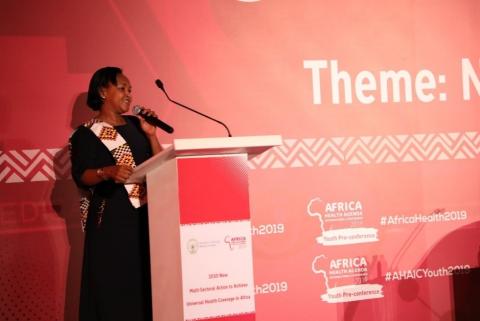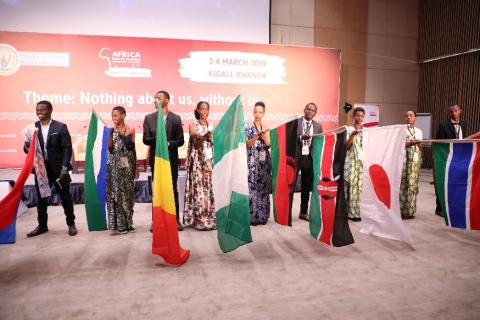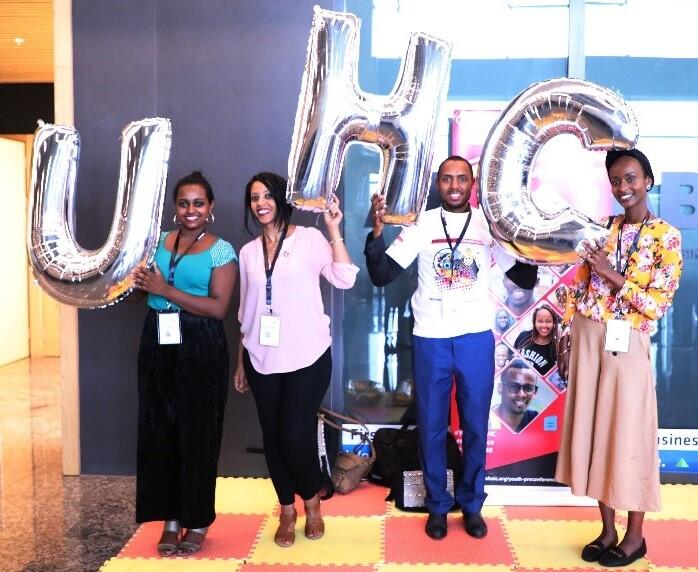“Nothing about us, without us” – a clear message that more than 300 young people from 24 countries across Africa delivered to the delegates gathered at the 2019 Africa Health Agenda International Conference (AHAIC) on Universal Health Coverage in Kigali, Rwanda from 5-7 March 2019.
“We, the young people of Africa constitute 65% of the continent’s population. If young people stand together, we cannot be ignored”.
Hon. Rosemary Mbabazi, Rwanda’s Minster of Youth, presiding over the Pre-Youth Conference highlighted that the continent can no longer afford to ignore the immense and energetic potential held by its youth and excluding this important segment of its population from key decisions making processes. Youth hold solutions to some of the most perplexing and pervasive problems that Africa faces.

“You are our change catalysts; you are our innovators; you are our present and our future”.
Therefore, young people need to be involved in decision making on matters that affect the continent especially on health and education. “Most importantly, young people need to be an integral part in decision making processes”, Honorable Minister added.
Young speakers, emphasized the need to move the conversations from conferences into communities and strengthen the skills of young people to hold governments accountable for the promises they have made in relation to Universal Health Coverage (UHC).
“We are privileged to be here at the conference, but with privileges comes responsibility. Our responsibility is to go back to our communities to share our knowledge about Universal Health Coverage and to go back to our governments to demand a seat at the table”.
To achieve Universal Health Coverage - access to sexual and reproductive health and rights, access to comprehensive sexuality education and affordable, quality services including contraception are required to ensure that no one is left behind - featured front and center of youth pre-conference deliberations.
“The numbers we hear about teenage pregnancies, HIV and unsafe abortions are not just numbers. Behind every number is a girl that we have left behind. We need to do better”.
Young people from across the continent launched the #Youth4UHC Movement - a platform to enable young people to foster the exchange of good practices, strategies and commitments from youth organizations and networks to influence national and regional consultation processes related to the Sustainable Development Goals (SDGs) and leading up to the High-Level Meeting on UHC in September 2019. #Youth4UHC Movement informed a position paper that was presented and informed recommendations from the main conference.

Representing the UNFPA Regional Director for East & Southern Africa, Mark Bryan Schreiner, highlighted that universal health coverage and access to SRHR for adolescent and youth is a right, and a demographic and development imperative. Yet, data from across the continent illustrates how young people are disproportionally affected by continued high levels of unmet need for contraception, risk of death and morbidity during pregnancy and child birth; and gender based violence, including FGM and child marriage.
“Never before and never again will there be such a large generation of young people ready and able to deliver change in their communities. The multi-dimensional needs of the youth require our sustained and undivided attention to ensure we nurture and allow for their fullest potential”.
Across East and Southern Africa, young women continue to bear a disproportionate burden of new HIV cases and youth are the only age group for which AIDS related deaths have not decreased. While Africa has come a long way since the adoption of the International Conference on Population and Development (ICPD) Programme of Action in 1994, the journey ahead requires accelerated efforts and more inclusive approaches for Africa to achieve targets set for 2030.

UNFPA’s presence and contributions to the AHAIC affirmed continued commitment to support the UHC agenda to build new alliances and partnerships, identify innovative solutions, and secure a new set of ambitious commitments essential to accelerate rights and choices for all – and in particular young people.
Maureen Twahirwa


